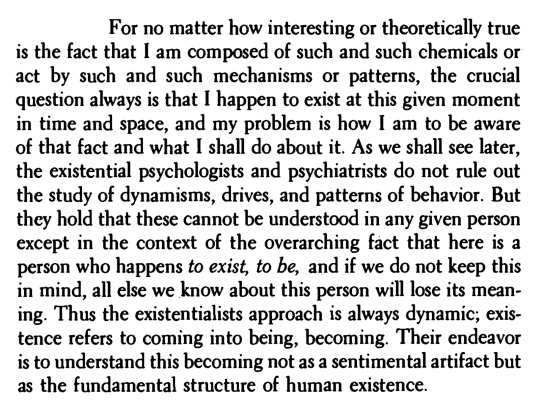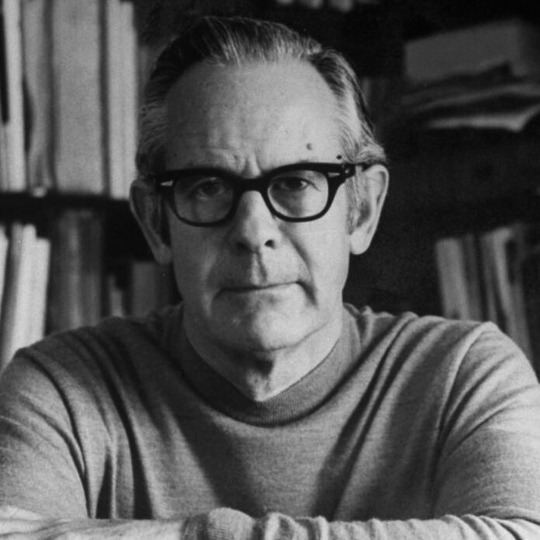#Rollo May
Explore tagged Tumblr posts
Quote
Creative people, as I see them, are distinguished by the fact that they can live with anxiety, even though a high price may be paid in terms of insecurity, sensitivity, and defenselessness for the gift of the “divine madness,” to borrow the term used by the classical Greeks. They do not run away from non-being, but by encountering and wrestling with it, force it to produce being. They knock on silence for an answering music; they pursue meaninglessness until they can force it to mean.
Rollo May
177 notes
·
View notes
Text

Rollo May, Man's Search for Himself
3K notes
·
View notes
Text
Writing Notes: The 4 Kinds of Love
Rollo May, in his 1969 book, "Love and Will," identified 4 kinds of love in Western tradition.
SEX
A biological function that can be satisfied through sexual intercourse or some other release of sexual tension.
Although it has become cheapened in modern Western societies, “it still remains the power of procreation, the drive which perpetuates the race, the source at once of the human being’s most intense pleasure and his [or her] most pervasive anxiety” (May, 1969, p. 38).
May believed that in ancient times sex was taken for granted, just as eating and sleeping were taken for granted.
In modern times, sex has become a problem:
First, during the Victorian period, Western societies generally denied sexual feelings, and sex was not a topic of conversation in polite company.
Then, during the 1920s, people reacted against this sexual suppression; sex suddenly came into the open and much of Western society was preoccupied with it.
May pointed out that society went from a period when having sex was fraught with guilt and anxiety to a time when not having it brought about guilt and anxiety.
EROS
In the United States, sex is frequently confused with eros.
Sex is a physiological need that seeks gratification through the release of tension.
Eros is a psychological desire that seeks procreation or creation through an enduring union with a loved one.
Eros is making love; sex is manipulating organs.
Eros is the wish to establish a lasting union; sex is the desire to experience pleasure.
Eros “takes wings from human imagination and is forever transcending all techniques, giving the laugh to all the ‘how to’ books by gaily swinging into orbit above our mechanical rules” (May, 1969, p. 74).
Eros is built on care and tenderness.
It longs to establish an enduring union with the other person, such that both partners experience delight and passion and both are broadened and deepened by the experience.
Because the human species could not survive without desire for a lasting union, eros can be regarded as the salvation of sex.
PHILIA
Eros, the salvation of sex, is built on the foundation of philia.
An intimate nonsexual friendship between two people.
Philia cannot be rushed; it takes time to grow, to develop, to sink its roots.
Examples of philia would be the slowly evolving love between siblings or between lifelong friends.
“Philia does not require that we do anything for the beloved except accept him, be with him, and enjoy him. It is friendship in the simplest, most direct terms” (May, 1969).
Harry Stack Sullivan placed great importance on preadolescence, that developmental epoch characterized by the need for a chum, someone who is more or less like oneself.
According to Sullivan, chumship or philia is a necessary requisite for healthy erotic relationships during early and late adolescence.
May, who was influenced by Sullivan at the William Alanson White Institute, agreed that philia makes eros possible.
The gradual, relaxed development of true friendship is a prerequisite for the enduring union of two people.
AGAPE
Just as eros depends on philia, so philia needs agape.
May (1969) defined agape as “esteem for the other, the concern for the other’s welfare beyond any gain that one can get out of it; disinterested love, typically, the love of God for man” (p. 319).
Agape is altruistic love.
It is a kind of spiritual love that carries with it the risk of playing God.
It does not depend on any behaviors or characteristics of the other person. In this sense, it is undeserved and unconditional.
In Summary
Healthy adult relationships blend all four forms of love.
They are based on sexual satisfaction, a desire for an enduring union, genuine friendship, and an unselfish concern for the welfare of the other person.
Such authentic love, unfortunately, is quite difficult.
It requires self-affirmation and the assertion of oneself.
“At the same time it requires tenderness, affirmation of the other, relaxing of competition as much as possible, self-abnegation at times in the interests of the loved one, and the age-old virtues of mercy and forgiveness” (May, 1981).
Sources: May, R. (1969). Love and will; May, R. (1981). Freedom and destiny
If these writing notes inspire you in any way, please tag me, or leave a link in the replies. I would love to read your work!
#writing notes#love#rollo may#psychology#emotions#writeblr#writers on tumblr#literature#writing prompt#poets on tumblr#spilled ink#dark academia#light academia#studyblr#character development#creative writing#writing reference#writing resources
291 notes
·
View notes
Text

“Hate is not the opposite of love; apathy is.”
— Rollo May
#rollo may#literature#lit#literature lover#literature quote#literature quotes#english literature#philosophy#philosophical#philosopher#philosophers#philosophy of life#philosophy quote#philosophy quotes#quote#quotes#excerpts#excerpt#quoteoftheday#booklover#book#bookworm#books#booklr#book quotes#book quotations
147 notes
·
View notes
Text
In order to be open to creativity, one must have the capacity for constructive use of solitude. One must overcome the fear of being alone.
Rollo May
#rollo may#may#quotes#philosophy#wisdom#life#literature#create#creative#art#artist#idea#ideas#meaning#overcome#overcoming#fear#being alone#the fear of being alone#thought#thinking#solitude
46 notes
·
View notes
Text

Rollo May
52 notes
·
View notes
Text
The human being cannot live in a condition of emptiness for very long: if he is not growing toward something, he does not merely stagnate; the pent-up potentialities turn into morbidity and despair, and eventually into destructive activities.
Man's Search for Himself
Rollo May
126 notes
·
View notes
Text
A myth is a way of making sense in a senseless world. Myths are narrative patterns that give significance to our existence.
— Rollo May
9 notes
·
View notes
Text
“Depression is the inability to construct a future.” ― Rollo May, Love and Will
14 notes
·
View notes
Text
hep kendini fazla önemsemesi öğretildi. şimdi kötülüğünün kökeninde kendine dair duyduğu kibrin yattığı belli değil mi?
rollo may - kendini arayan insan
#kitap#edebiyat#blogger#felsefe#kitaplar#blog#kitap kurdu#charles bukowski#friedrich nietzsche#rollo may#kendini arayan insan#insanın anlam arayışı#emily dickinson#jane austen#aşk ve gurur#alain de botton#jean paul sartre#bulantı#albert camus#john berger#franz kafka#bertolt brecht#milan kundera#ahmet hamdi tanpınar#huzur#saatleri ayarlama enstitüsü#orhan pamuk#murathan mungan#haruki murakami#oscar wilde
25 notes
·
View notes
Text
When a nation is psychologically and spiritually empty, totalitarianism comes in to the fill the vacuum; and the people sell their freedom as a necessity for getting rid of the anxiety which is too great to bear any longer.
Rollo May

72 notes
·
View notes
Photo

Rollo May, The Discovery of Being: Writings in Existential Psychology
188 notes
·
View notes
Text

5 notes
·
View notes
Text

“To love means to open ourselves to the negative as well as the positive — to grief, sorrow, and disappointment as well as to joy, fulfillment, and an intensity of consciousness we did not know was possible before.”
— Rollo May, “Love and Will”
#rollo may#literature#lit#literature lover#literature quote#literature quotes#english literature#philosophy#philosophical#philosopher#philosophers#philosophy quotes#philosophy of life#quote#quotes#excerpts#excerpt#quoteoftheday#booklover#book#bookworm#books#book quotes#book quotations#love quote#love quotes#lovers#love
28 notes
·
View notes
Text
Depression is the inability to construct a future.
Love and Will by Rollo May
2 notes
·
View notes
Text

Romance Sentimentale, 1930
+
“Creative people, as I see them, are distinguished by the fact that they can live with anxiety, even though a high price may be paid in terms of insecurity, sensitivity, and defenselessness for the gift of the “divine madness,” to borrow the term used by the classical Greeks. They do not run away from non-being, but by encountering and wrestling with it, force it to produce being. They knock on silence for an answering music; they pursue meaninglessness until they can force it to mean.” ― Rollo May, The Courage to Create
58 notes
·
View notes